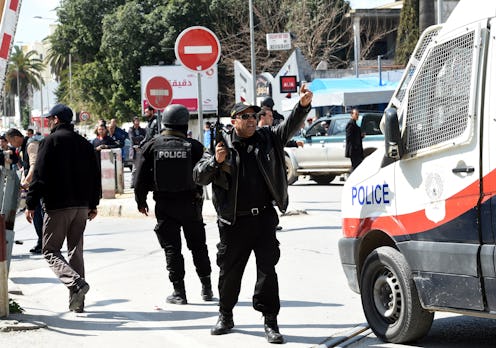News
Tunisia Was A Good Tourist Bet Before The Shooting
The Tunisia museum shooting that has reportedly left 19 dead — 17 of whom are tourists — is a major blow to the country that has largely been an exception to the violent rule in North Africa and the Middle East. The deliberate attack at the National Bardo Museum, a popular destination for foreigners, begs the question of whether or not Tunisia is safe for tourists. CNN reports two gunmen were killed during police fire while up to three attackers might still be at large in the city.
Several foreign governments have issued travel warnings to citizens to stay away from the area, which includes the national parliament building. The U.S. Embassy in Tunis cautioned travelers to avoid Tunisia's central, southern, and border regions. From the British embassy, authorities have warned U.K. citizens, "There is a high threat from terrorism, including kidnapping. Attacks could be indiscriminate, including places visited by foreigners."
For six months, flights from some areas of Libya to Tunisia were suspended due to increased fighting in the region. Tunisia on Tuesday reopened airspace to flights from Tripoli and other western Libyan airports. That same day — within 24 hours of Wednesday's attack — tourism minister Selma Elluni Rekik told Italian news wire agency ANSA that Tunisia was safe for tourists and visitors and denied reports of terrorism risks.
Of course the situation in Libya does not help, as is always the case when there are problems in neighboring countries. However, our borders are absolutely impermeable to any infiltration attempt. There is no security problem in Tunisia. Everything is under control.
Though the birthplace of the Arab Spring anti-government movement, Tunisia has been considered a success story of the North Africa and Middle East region. Since 2011, there have been several instances of deadly protests and Islamist extremism, and authorities have estimated that 3,000 Tunisians have traveled to Iraq and Syria to join ISIS or an al Qaeda affiliate Jabhat al-Nusra, according to The Daily Beast. Tunisia has also seen two free elections, and it has secured relative stability compared to its war-torn neighbors Libya, Egypt, and Syria.
That has allowed Tunisia's tourism industry to recover. According to CNN, Tunisia saw its tourism numbers drop 30 percent to 4.8 million visitors in 2011, the year when the Arab Spring began. Those numbers have since steadily rose as foreigners began to flock to Tunisia's coastal resorts and ancient Greek ruins. Before the museum shooting, the country's tourism industry was never directly threatened.
In 2014, The Economist dubbed Tunisia "country of the year" because it "nurtured hope in a wretched region and a troubled world." Tunisia has been a beacon of promise in the North Africa and Middle East region, much of which is still plagued by ongoing civil wars and violence. The tragic museum shooting should not deter the huge progress the country has made, and I, for one, will keep Tunisia at the top of my travel bucket list.
